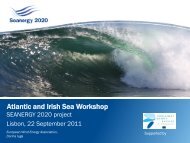Comparative analysis of Maritime Spatial Planning ... - Seanergy 2020
Comparative analysis of Maritime Spatial Planning ... - Seanergy 2020
Comparative analysis of Maritime Spatial Planning ... - Seanergy 2020
You also want an ePaper? Increase the reach of your titles
YUMPU automatically turns print PDFs into web optimized ePapers that Google loves.
6 SECTOR CONFLICT MANAGEMENT6.1 Why is sector conflict management important to <strong>Maritime</strong> <strong>Spatial</strong> <strong>Planning</strong> (MSP)?Sector conflict management is one <strong>of</strong> the overall aims <strong>of</strong> an integrated approach to MSP. The objective isto make best possible economic and societal use <strong>of</strong> the maritime space, reconcile different interests andclaims on the space and streamline developments. Managing potential sector conflicts early on preventsobjections from being raised later in the process and avoids objections reaching the courts which can belengthy, expensive and may lead to cancellation <strong>of</strong> the project. Sector conflict management is also acoordination issue and facilitates development by ensuring that government departments are inagreement and do not give conflicting advice.6.2 Progress per sea basinIn the North Sea one <strong>of</strong> the main mechanisms for managing sector conflicts has been through zoningexercises. In some countries such as Germany and Belgium zoning has been adopted as part <strong>of</strong> an overallmaritime spatial plan, whereas in other countries such as the Netherlands and the UK zoning has beendone on a sectoral basis and is non-binding. Another method has been the development <strong>of</strong> sectoralguidelines to help minimise conflicts, for example practical solutions such as recommended buffer zonesand noise/glare reductions methods. Consultations are a major method <strong>of</strong> managing conflicts and as seenunder the Consultation Criterion this is well developed for the North Sea countries.In the Baltic Sea there have been a number <strong>of</strong> pilot maritime spatial plans developed as part <strong>of</strong> the EUfundedBaltSeaPlan project. However, these plans are for the most part voluntary and have not yet beenintegrated into national level policies. In many cases conflicts are managed through consultations as part<strong>of</strong> Environmental Impact Assessment <strong>of</strong> individual projects. Sweden has a well developed consultationprocess which goes a long way to resolve conflicts, but it is not clear whether there are binding rules onprioritising sectors.Within the Atlantic a number <strong>of</strong> countries (e.g. UK, France, Portugal, Ireland) have undertaken sectoralplans (e.g. for <strong>of</strong>fshore renewables) that have identified opportunity zones where there are minimalconflicts and areas with a high level <strong>of</strong> potential conflicts. These exercises have <strong>of</strong>ten been accompaniedby Strategic Environmental Assessments (SEAs) which have provided stakeholders an opportunity tohighlight issues or win-win solutions.In the Mediterranean area there have also been some sectoral zoning exercises and related SEAs, but thesuccess <strong>of</strong> these in managing conflicts is <strong>of</strong>ten related to the quality <strong>of</strong> stakeholder consultation (which islower for Italy and Greece than for France and Spain).Deliverable 2.335 | P a g e






